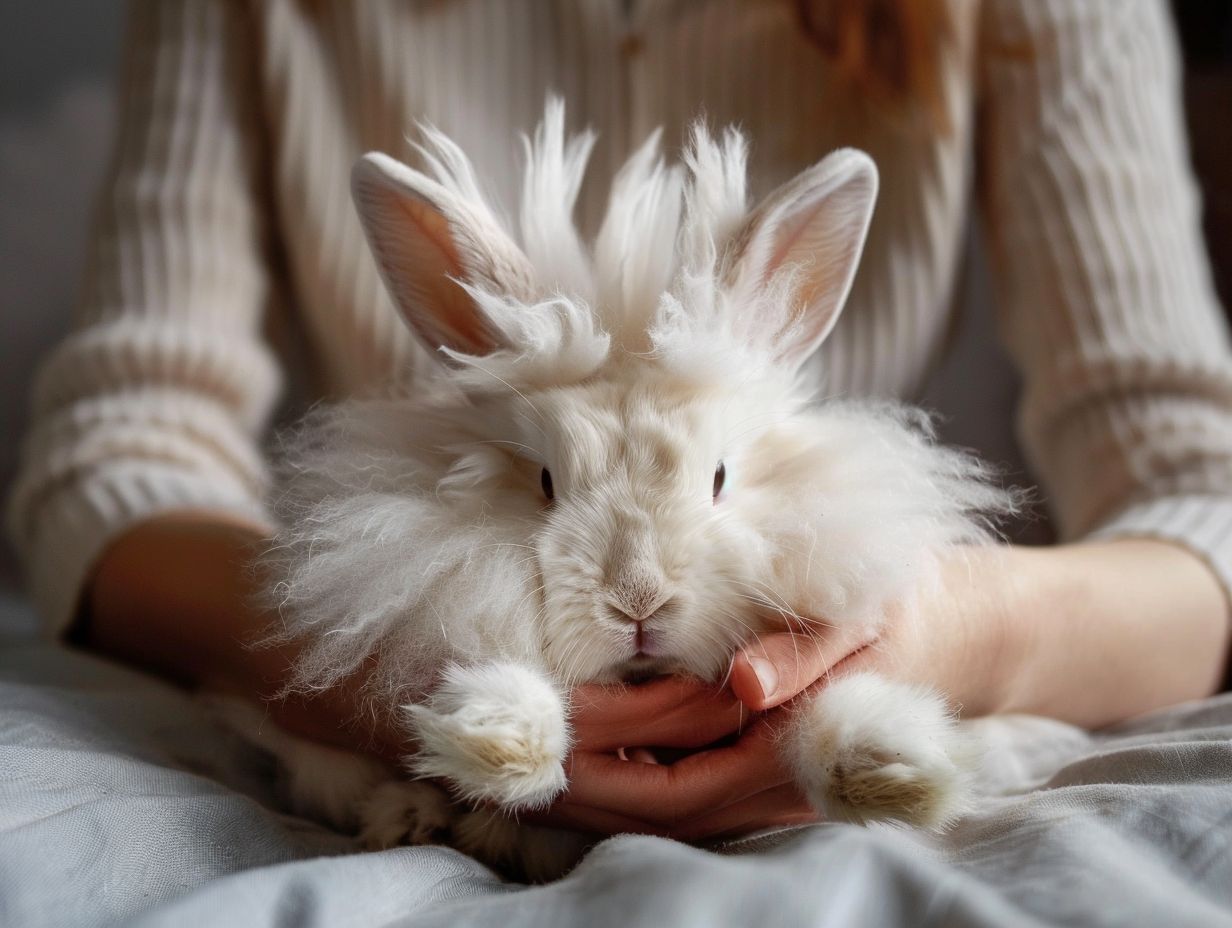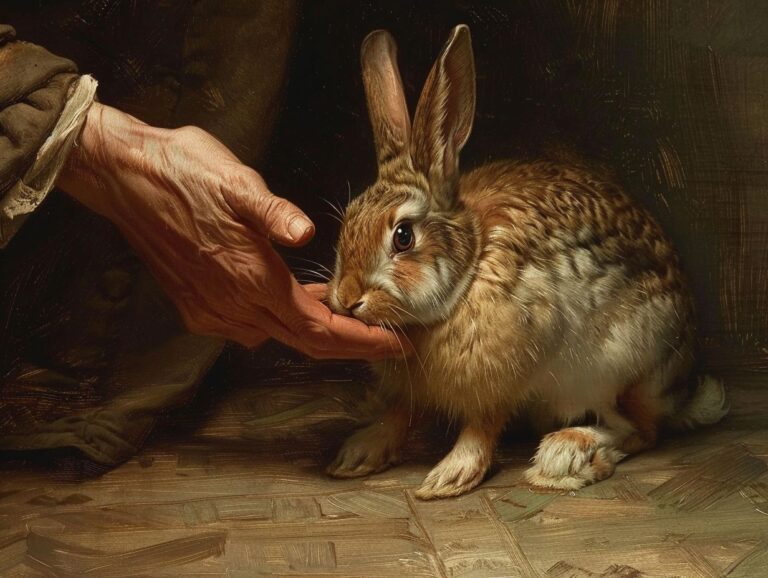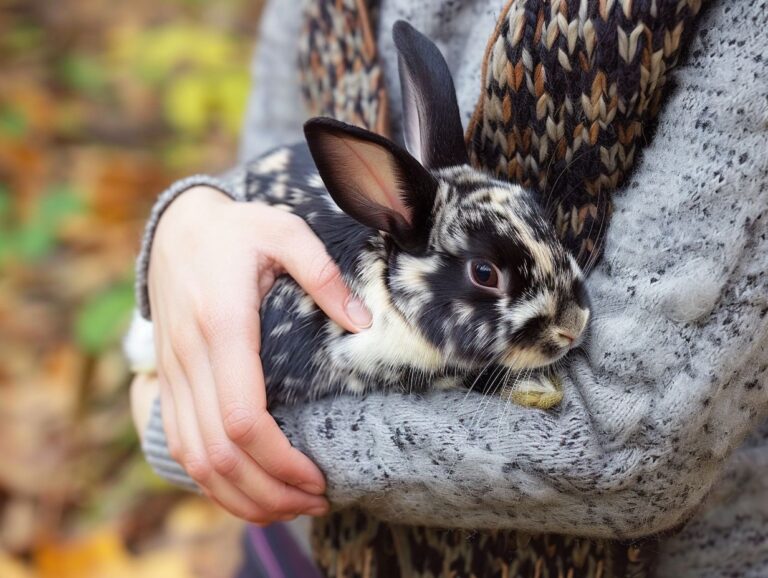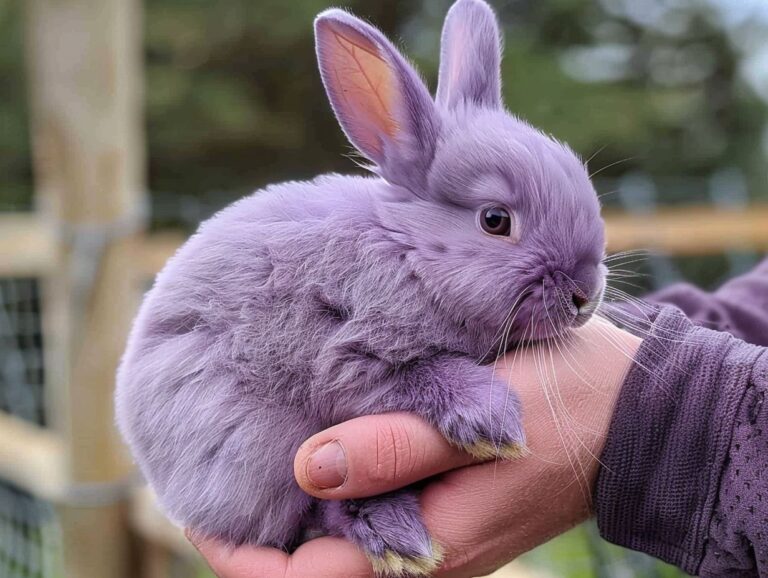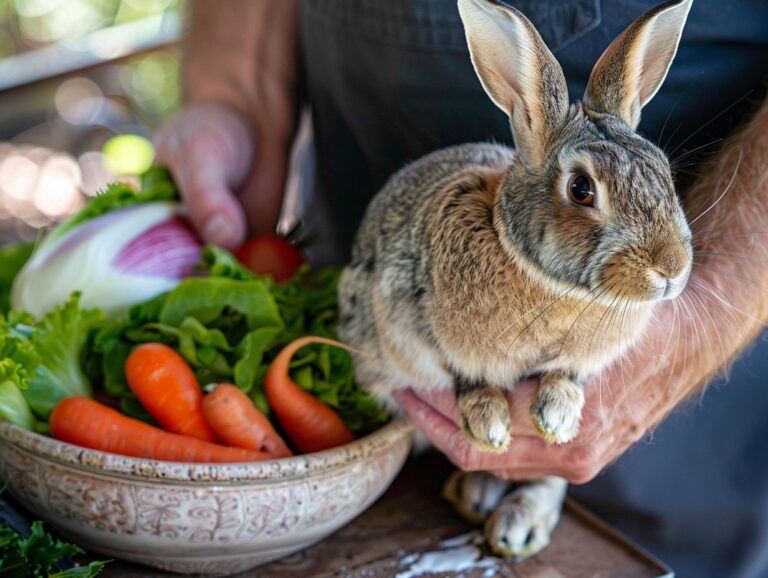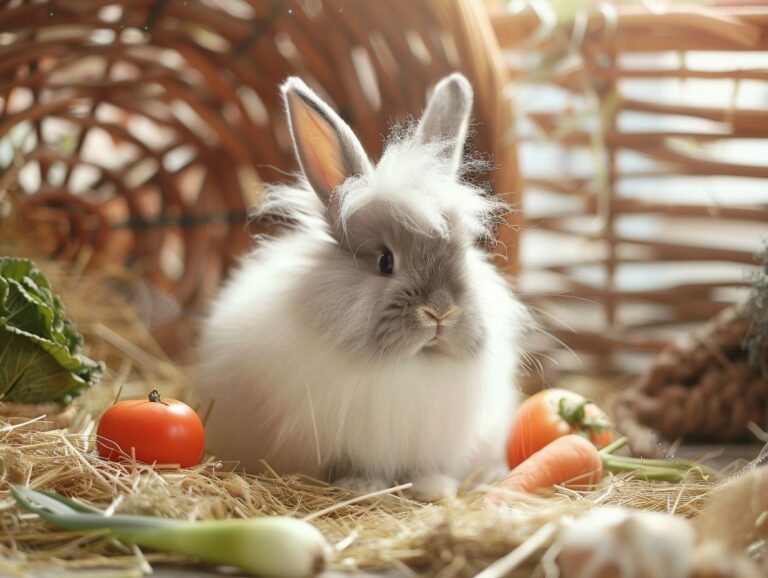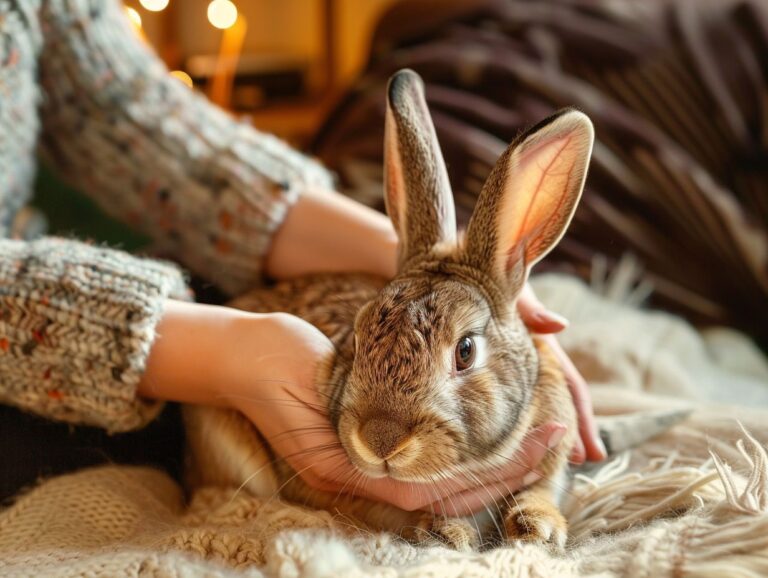French Angora Rabbits As Pets: Care, Diet, and Health For Medium Sized Breeds
Are you considering getting a French Angora rabbit as a pet? These medium-sized rabbit breeds are not only adorable but also come with their own set of characteristics, pros, and cons.
From their soft and luxurious fur to their friendly and social nature, French Angora rabbits make great companions. They do require high grooming needs and may have potential health issues.
In this article, we will delve into the ideal diet for French Angora rabbits, common health issues for medium-sized rabbit breeds, and how to properly care for these fluffy pets.
Let’s explore all you need to know about French Angora rabbits as pets.
Key Takeaways:
What Are French Angora Rabbits?
French Angora rabbits are a popular breed known for their luxurious wool and friendly demeanor. They are a specific type of Angora rabbit, characterized by their distinctive fur and overall appearance.
Originating in France, these rabbits have a fascinating history dating back to the 18th century when they were initially bred for their soft fiber. The exquisite wool of French Angoras is highly prized among artisans and fiber enthusiasts for its exceptional warmth and softness, making it ideal for crafting luxurious garments and accessories.
Their grooming needs are unique, requiring regular brushing to prevent matting and maintain the quality of their wool. Due to their calm and docile nature, French Angoras make delightful pets, forming strong bonds with their owners and enjoying gentle interactions.
What Are the Characteristics of Medium Sized Rabbit Breeds?
Medium-sized rabbit breeds typically range between 6 to 9 pounds and exhibit a variety of characteristics based on their breed. Some popular medium-sized rabbit breeds include English Angora and Giant Angora, each with unique traits and health considerations.
These medium-sized rabbit breeds are known for their friendly and docile nature, making them ideal pets for families and individuals alike. English Angoras are famous for their long, silky fur that requires regular grooming to prevent matting. On the other hand, Giant Angoras boast a larger size and thick, plush coats that provide ample warmth during colder months.
In terms of health, medium-sized rabbit breeds can be prone to dental issues like malocclusion, which require proper dental care and a diet high in fiber to prevent. Regular check-ups with a veterinarian are essential to ensure their well-being and longevity. To learn more about caring for small rabbits, check out this guide on Dutch rabbits care.
Grooming needs for these breeds differ, with English Angoras needing frequent brushing to maintain their luxurious coats, while Giant Angoras benefit from weekly grooming sessions to prevent any tangles or matting.
What Are the Pros and Cons of Owning a French Angora Rabbit?
Owning a French Angora rabbit comes with its own set of advantages and disadvantages. From their soft and luxurious fur to potential health issues, it is essential to understand the pros and cons before bringing one home.
The French Angora rabbit is cherished for its long, silky wool that requires regular grooming to prevent matting and tangling. Despite their beautiful coat, extensive grooming sessions can be time-consuming and require dedication. Nonetheless, the act of grooming promotes bonding between the owner and the rabbit, establishing a unique connection. When considering potential health problems, French Angoras are susceptible to wool block, a condition where their digestive system becomes obstructed by ingested fur. To prevent this, a high-fiber diet and proper grooming practices play a crucial role in maintaining their well-being.
Pros:
The pros of owning a French Angora rabbit include their soft and luxurious fur, low maintenance grooming, and friendly and social nature.
-
Soft and luxurious fur: French Angora rabbits are known for their beautiful long fur that has a silky texture and comes in various colors such as white, black, and chocolate. Their fur is not only visually stunning but also incredibly soft to the touch, making them delightful to cuddle and pet.
-
Low maintenance grooming: Despite their long fur, French Angora rabbits surprisingly have relatively low grooming needs. Their coat only requires regular brushing and occasional trimming to prevent matting and keep it in top condition.
-
Friendly and social nature: These rabbits are incredibly sociable and enjoy human interaction. They are known for being affectionate, gentle, and docile companions, often forming strong bonds with their owners and being comfortable around children and other pets.
Cons:
Despite their positive traits, owning a French Angora rabbit can come with challenges such as high grooming needs and the potential for health issues.
French Angora rabbits boast luxurious long fur that requires frequent grooming to prevent matting and tangling. This entails daily combing and regular trims to maintain their coat in top condition, as neglecting grooming can lead to hygiene problems and discomfort for the rabbit.
Alongside grooming demands, these rabbits are prone to certain health issues including gastrointestinal stasis and flystrike. To mitigate these risks, owners should provide a high-fiber diet to promote digestive health and regularly check their rabbits for any signs of illness or parasites.
What Is the Ideal Diet for a French Angora Rabbit?
Maintaining a proper diet is crucial for the health and well-being of a French Angora rabbit. Their ideal diet should consist of hay, fresh vegetables, fruits, and commercial rabbit pellets to ensure they receive the necessary nutrients.
Belgian Hare is an essential component of a French Angora rabbit’s diet as it provides the necessary fiber for their digestive system to function properly.
Fresh vegetables should be offered daily to introduce a variety of vitamins and minerals into their diet.
Fruits, although delicious, should only be given sparingly due to their high sugar content which may lead to health issues if fed excessively.
Additionally, commercial rabbit pellets play a significant role in providing essential nutrients such as protein, fiber, and minerals to ensure the rabbit’s overall health and well-being.
Hay
Hay is a staple in the diet of a French Angora rabbit, providing essential fiber and promoting digestive health.
French Angora rabbits have a unique digestive system that requires high-fiber foods like hay to aid in digestion and prevent gastrointestinal issues. The long strands of hay help wear down their continuously growing teeth, preventing dental problems commonly seen in rabbits. Additionally, hay provides important nutrients such as vitamin A and D, which are crucial for their overall well-being. It also helps maintain proper gut motility and reduces the risk of obesity by promoting a healthy weight balance. Owners can offer a variety of hays such as timothy, orchard grass, or oat hay to ensure a balanced diet for their French Angora rabbit.
Fresh Vegetables and Fruits

So, including a variety of fresh produce like leafy greens (such as kale, spinach, and parsley), bell peppers, and berries can provide essential vitamins and minerals for these fluffy companions.
Ensuring portion control is crucial to prevent digestive issues; a good rule of thumb is offering about two cups of fresh veggies per six pounds of body weight daily.
These dietary additions not only support digestive health but also help in maintaining a healthy weight and a shiny, soft coat for your French Angora rabbit.”
Commercial Rabbit Pellets
Commercial rabbit pellets are a convenient way to provide essential nutrients and balanced nutrition to French Angora rabbits, supporting their overall dietary requirements.
An important aspect to consider when choosing commercial rabbit pellets is their nutritional content, which should ideally include a good balance of protein, fiber, and essential vitamins and minerals crucial for the health of French Angora rabbits. It is recommended to opt for reputable brands that offer high-quality pellets specifically formulated for rabbits. Brands like Oxbow, Kaytee, and Small Pet Select are often favored by rabbit owners for their premium ingredients and balanced formulations.
What Are the Common Health Issues for Medium Sized Rabbit Breeds?
Medium-sized rabbit breeds are susceptible to various health issues that can impact their well-being and longevity. Understanding these common problems is essential for proper care and management.
One of the important aspects to consider when it comes to the health of medium-sized rabbit breeds is their breeding practices. It is crucial to avoid inbreeding as it can lead to genetic predispositions to certain health conditions. Maintaining a balanced diet and providing adequate exercise are vital for ensuring a healthy lifespan. Common health problems that medium-sized rabbit breeds may face include dental issues, such as overgrown teeth, which can affect their ability to eat properly.
Gastrointestinal Stasis
Gastrointestinal stasis is a common health issue seen in medium-sized rabbit breeds, characterized by a slowdown or stoppage of the digestive system.
Several factors can trigger gastrointestinal stasis in rabbits, such as a diet low in fiber, limited exercise, stress, or dental issues. When a rabbit experiences gastrointestinal stasis, common symptoms include reduced or absent fecal output, reduced appetite, lethargy, and possibly, discomfort. It is essential to monitor your rabbit’s eating habits and droppings daily to detect early signs of medium-sized breed rabbit care.
Treatment often involves a combination of dietary changes, increased hydration, medications, and encouraging movement. Proactive measures like providing a diet rich in fiber, access to fresh water, regular exercise, and managing stress levels can prevent gastrointestinal stasis. Failure to address stasis promptly can lead to severe complications like dehydration, bloating, or even intestinal blockages.
Dental Problems
Dental problems are prevalent among medium-sized rabbit breeds and can lead to eating difficulties and discomfort.
One of the most common dental issues in rabbits is malocclusion, where the teeth do not align properly, leading to overgrowth and potential spurs. This can result in difficulty eating, drooling, weight loss, and even abscesses. Treatment options for malocclusion include dental trims under sedation by a specialized veterinarian. Regular dental check-ups are crucial for early detection and monitoring of dental problems. Providing a diet rich in hay and chew toys can help wear down their teeth naturally and prevent issues from occurring. By incorporating these preventive measures, rabbit owners can ensure their furry companions maintain good dental health.”
Ear Infections
Ear infections are a concern for medium-sized rabbit breeds, affecting their ear health and overall well-being.
These infections are commonly caused by bacteria, yeast, or parasites entering the ear canal, often due to poor hygiene or prolonged exposure to damp environments. Symptoms include head shaking, ear scratching, redness, swelling, and discharge from the ear. It is vital for rabbit owners to regularly inspect the ears, keep them clean, and provide suitable bedding to prevent infections. Veterinarians may prescribe antibiotic or antifungal medications, ear flushes, or in severe cases, surgical intervention. Early detection and proper treatment are crucial for managing ear infections in rabbits.
Respiratory Infections
Respiratory infections are a common health issue that can affect the respiratory system of medium-sized rabbit breeds, leading to breathing difficulties and discomfort.
These infections are often caused by factors such as poor ventilation in living quarters, exposure to harsh weather conditions, or contact with infected animals.
Common symptoms of respiratory infections in rabbits include sneezing, nasal discharge, coughing, and wheezing.
It is crucial to consult a veterinarian for proper diagnosis and treatment options, which may include antibiotics, supportive care, and improving living conditions.
To prevent respiratory infections, ensure a clean and dry environment, proper ventilation, and regular health checks for your rabbit to maintain optimal respiratory health.
How to Care for a French Angora Rabbit as a Pet?
Caring for a French Angora rabbit involves providing adequate grooming, nutrition, and living conditions to ensure their well-being and happiness as a beloved pet.
French Angora rabbits have long, fluffy fur that requires regular grooming to prevent matting and tangling. Brushing their fur daily with a gentle slicker brush helps maintain its quality and reduces the risk of hairballs. In terms of nutrition, these rabbits benefit from a diet rich in fiber and low in sugar, including high-quality hay, fresh vegetables, and a limited amount of pellets. Creating a spacious, well-ventilated living space with ample room for exercise and enrichment activities is crucial for their physical and mental health.
Provide a Spacious Living Area

When considering a hutch for a French Angora rabbit, it’s essential to prioritize space that allows for natural movements and hopping. Along with size, ventilation is key to maintaining good air quality and preventing respiratory issues.
- Bedding options like hay or straw not only provide comfort but also aid in absorbing waste and controlling odors. Ensure the bedding is cleaned regularly to maintain cleanliness and prevent health problems.
- Environmental enrichment, such as safe chew toys, tunnels, and platforms, can keep your rabbit mentally stimulated and physically active.
Providing a well-equipped living space is integral to promoting the overall well-being of your furry companion.
Regular Grooming and Nail Trimming
Regular grooming and nail trimming are essential tasks to maintain the well-being and hygiene of a French Angora rabbit, ensuring their fur remains clean and mat-free.
In terms of grooming a French Angora rabbit, it is crucial to have the right tools at hand. A soft-bristled brush helps to remove loose fur and prevent matting, while a slicker brush is useful for untangling any knots gently. Trim their nails regularly with a nail trimmer designed for small pets, taking care not to cut too close to the quick to avoid any bleeding. Checking their ears for signs of wax buildup and cleaning them with a gentle ear cleanser can prevent infections.
Regular Veterinary Check-ups
Regular veterinary check-ups are crucial for monitoring the health and detecting any potential issues early on in French Angora rabbits.
These check-ups play a vital role in ensuring the overall well-being of your furry friend. During these visits, the vet can examine your rabbit’s eyes, teeth, ears, and fur, looking for any signs of illness or abnormality. In addition, vaccinations are essential to protect your rabbit from common diseases like rabbit hemorrhagic disease and myxomatosis.
Preventive measures such as parasite control and proper grooming practices are also discussed during check-ups. Regular veterinary care helps establish a baseline for your rabbit’s health, making it easier to identify any deviations from normal behavior or symptoms of illness.
Socialization and Exercise
Socialization and regular exercise are essential for promoting mental stimulation and physical well-being in French Angora rabbits, enhancing their overall quality of life.
One of the key benefits of socializing French Angora rabbits is that it helps them develop a bond with their human caregivers, leading to increased trust and less stress during handling.
Interactive play sessions provide mental enrichment, preventing boredom and potential behavioral issues.
In terms of exercise, supervised outdoor time allows these rabbits to explore new environments safely, stimulating their natural curiosity and providing essential physical activity. For small breeds’ care, their diet, and health are essential considerations.
Considering the social nature of French Angora rabbits, introducing a compatible rabbit companion can offer added companionship and opportunities for social interaction, promoting a happier and more fulfilled life.
Conclusion
In conclusion, caring for Angora rabbits, especially French Angoras, requires attention to grooming, health monitoring, and providing a suitable living environment. Understanding their specific needs and characteristics is crucial for ensuring their well-being and happiness as pets.
Grooming is a fundamental aspect of Angora rabbit care, with regular brushing to prevent matting and potential health issues. Their long, silky fur requires gentle handling and frequent attention to avoid tangles. Trimming their coat may also be necessary, especially around the hindquarters to maintain cleanliness. Engaging in health check-ups and monitoring signs of illness are essential to detect any problems early. Proper diet, sufficient exercise, and a comfortable shelter with adequate space for movement are also vital components of their care routine to support their overall health and well-being.
References
For additional information on Angora rabbit care, grooming, and health, refer to reputable sources such as rabbit breeders associations, veterinary websites, and specialized publications in rabbit husbandry.
These sources can offer valuable insights into Angora rabbit maintenance, grooming techniques, and potential health issues specific to this breed. The American Rabbit Breeders Association (ARBA) provides detailed guidelines on caring for Angora rabbits, while websites like House Rabbit Society offer practical tips on grooming and health monitoring.
Publications such as Rabbit Welfare Association & Fund (RWAF) magazines and Rabbit Health News can be excellent resources for staying updated on best practices and emerging health trends in Angora rabbit care.
FAQs about French Angora Rabbits
Answers to common questions about French Angora rabbits, their care, grooming needs, health issues, and dietary requirements can provide valuable insights for new and experienced rabbit owners.
One of the primary concerns for French Angora rabbit owners is their grooming requirements, as their long, silky fur requires regular maintenance to prevent matting and tangling. In addition, these rabbits are prone to health issues such as wool block, which occurs when they ingest too much of their fur during grooming. Providing a high fiber diet is crucial to help prevent wool block and maintain their digestive health. Understanding the specific needs of French Angora rabbits can contribute to their overall well-being and longevity.
How often should I groom my French Angora rabbit?
Grooming frequency for French Angora rabbits depends on their fur type and length. Regular brushing is recommended to prevent matting and maintain a healthy coat.
French Angora rabbits, known for their long, soft fur, require dedicated grooming to keep the coat in top condition. It’s essential to brush them at least a few times a week to remove loose fur and prevent tangles.
American Sable Rabbits as Pets: Proper grooming not only enhances their appearance but also contributes to their overall health and well-being.
Using the right tools like gentle slicker brushes and metal combs can make the grooming process more effective and comfortable for the rabbits. Ensuring a calm and quiet environment during grooming sessions can help these sensitive rabbits feel more at ease.
What are the common health problems in French Angora rabbits?

Wool block, a potentially serious issue for French Angora rabbits, occurs when their gastrointestinal tract becomes blocked with ingested fur, leading to symptoms like reduced appetite and lethargy. Prevention measures include providing high-fiber hay and grooming them regularly to minimize excessive fur ingestion.
Ear infections, another common concern, can result from poor hygiene or mites. For Lilac rabbits as pets, regular inspection of ears, cleaning, and prompt treatment by a veterinarian are crucial.
Dental problems, such as overgrown teeth, can affect their ability to eat. Ensuring they have access to chew toys and appropriate feeding options can help maintain the health of small rabbit breeds.
Frequently Asked Questions
What are some characteristics of French Angora rabbits that make them suitable as pets?
French Angora rabbits are known for their gentle and docile nature, making them great companions and pets. They are also highly intelligent and can be easily trained, making them a joy to have around. Their long and soft wool also makes them a popular choice for those looking for a unique pet.
What should I consider when caring for a French Angora rabbit?
When caring for a French Angora rabbit, it is important to provide them with ample space to hop and exercise. They also require frequent grooming to maintain the health of their coat. Additionally, they should have a balanced diet consisting of high-quality hay, fresh vegetables, and a small amount of pellets.
How much do French Angora rabbits weigh?
French Angora rabbits are considered a medium-sized breed, typically weighing between 6 to 9 pounds. It is important to monitor their weight and ensure they are not overweight, as this can lead to health problems.
What should I feed my French Angora rabbit?
A French Angora rabbit’s diet should consist mainly of high-quality hay, such as timothy or orchard grass. This should be supplemented with fresh vegetables, such as leafy greens and root vegetables, and a small amount of pellets. It is important to avoid giving them sugary treats, as this can lead to digestive issues.
Are there any health concerns specific to French Angora rabbits?
One health concern for French Angora rabbits is the potential for wool block, where the rabbit’s digestive system becomes blocked by ingested hair. This can be prevented by regularly grooming the rabbit and providing them with plenty of hay to aid in digestion. They may also be prone to dental issues, so it is important to monitor their dental health and provide appropriate chew toys.
How can I ensure my French Angora rabbit stays healthy?
In addition to a balanced diet and regular grooming, it is important to take your French Angora rabbit to a veterinarian experienced in rabbit care for regular check-ups. This can help catch any potential health issues early on and ensure your rabbit stays happy and healthy.

